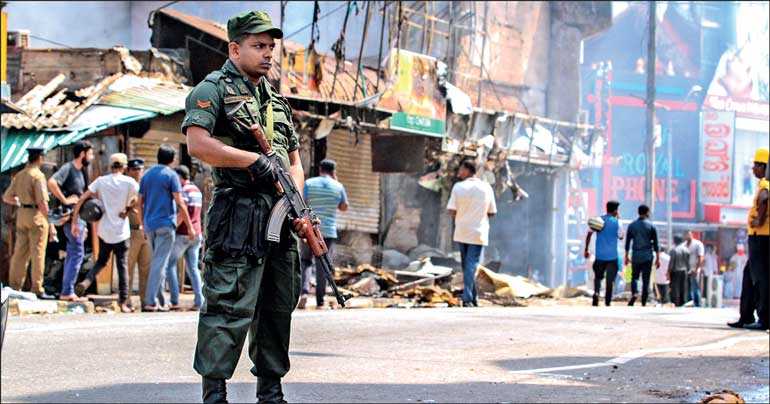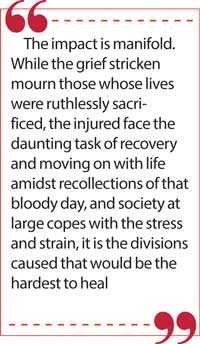Thursday Feb 19, 2026
Thursday Feb 19, 2026
Thursday, 30 May 2019 00:00 - - {{hitsCtrl.values.hits}}

In 2009 Sri Lanka defeated terrorism on its soil, ending the terrorist conflict that claimed thousands of lives, destroyed the Sri Lankan economy and set the country back by several decades. In the same year the country entered into partnership with the Shanghai Cooperation Organization (SCO), which was a milestone for the grouping as it welcomed its first Dialogue Partner. 
For Sri Lanka, having ended a ruthless conflict, it was an opportunity to share the experience and enhance cooperation with a vital region of the world. A decade later an assessment of this relationship indicates the vast potential, untapped areas and hitherto unexplored prospects, for both the SCO and Sri Lanka, especially in the wake of the Easter Sunday attacks and the rise of extremism on the island. It questions the original rationale for gaining partnership and denotes the inherent need for strategising foreign policy, on the part of Sri Lanka, if the relationship is to be strengthened and a mutually-beneficial bond nurtured.
When the Council of Heads of State met in Yekaterinburg in June 2009, it was to implement a decision taken the year before, wherein the SCO was creating Dialogue Partner status for ‘a state or an organisation (that) shares the goals and principles of the SCO and wishes to establish relations of equal mutually beneficial partnership with the Organisation’ and to accord such status ‘to a state or an organisation who cooperates with the SCO in specific areas of activity envisaged by the Charter and other treaty documents in the framework of the Organisation.’
Pursuant to the signing of the Memorandum granting Sri Lanka Dialogue Partner status in May 2010, Russia observed that its implementation would lead to a strengthening of international connectivity and expand spheres of interaction between the SCO member states and Sri Lanka. This, Russia believed, would be mainly in the areas of ‘ensuring security and stability, combating terrorism and developing economic, trade and investment cooperation.’
A founder member of the Organisation, with whom bilateral ties have grown since such connectivity was embarked upon in 1957, Russia has remained an unwavering ally of Sri Lanka. The degree of cordiality, even during the Cold War and thereafter, is evidence of the strength of the foundation, and bodes well for the decades ahead.
China has consistently called for ‘upholding the ‘Shanghai Spirit’ of mutual trust, mutual benefit, equality, consultation, respect for cultural diversity and pursuit of common development, in a bid to build a community of shared destiny in the region’. President Xi Jinping highlighted the relevance of the ‘Shanghai Spirit’ as “a guide to safeguard international fairness and justice, advocate multilateralism and the ideal of opening, respect each other’s interests, oppose interference in other countries’ internal affairs, solve disputes through peaceful means, and boost common development with the win-win ideal.” 
Collaboration through other mechanisms including the Belt and Road Initiative (BRI), and the Asian Infrastructure Investment Bank (AIIB), as well as direct economic partnerships have seen the building of a relationship based on history, but one that is directly relatable to the Rubber-Rice Pact of 1952 and the establishment of diplomatic relations in 1957.
Although Russia and China remain the key guiders of the SCO, the role played by the four Central Asian countries, notably Kazakhstan, the Kyrgyz Republic, Tajikistan and Uzbekistan cannot be discounted. Identified as critical for the achievement of the Asian Century, these four countries have experienced improving economies and thereby growing prosperity. The inclusion of India and Pakistan as the newest Members in 2017 reinvigorated the SCO, as its geography, population, economic potential and overall power grew in leaps and bounds, making it the largest regional organisation.
Although disturbing activities, in early 2019, raised the propensity for doubt to rise over the decision of including these two countries, it is in the long term, that the fruit of such action would be truly understood. The need for all members to engage in joint all-SCO military exercises, partake in military cooperation, as well as share intelligence, would, in hindsight be a realisation of the sentiments expressed by President Xi at the Summit in Ufa in 2015. He called for members “to increase the action ability, create a strong security wall in the region”. The espousal of collective action included Xi’s emphasis on members being “more proactive in political contacts and coordination, work out response measures and together defend the security as well as stability in all member states of our organisation.”
Though apparent that collective action would bode well for SCO members, it is the impact that such action would have elsewhere, that is significant. India and Pakistan, as members of the SCO, would be called upon to engage at varied levels and on numerous occasions. Given that all member states must uphold the core principle of non-aggression and non-interference in internal affairs, in addition to conformity to the origin objective of creating a confidence-building forum to demilitarise borders, India and Pakistan would recognise the potential for themselves, of working together, for the realisation of the Asian Century in the long term, and the need to counter terror in all its forms in the immediate to medium term. The results would be seen in their bilateral interactions and equally importantly in the South Asian region, in a decade and a half.
Whilst countering terrorism, extremism and separatism within its region became the raison d’être of the SCO, it didn’t limit itself to these three ‘evils’ but explored economic connectivity and the promise of closer cooperation to enhance trade and prosperity among its member states.
In 2015, Sri Lanka sought to upgrade the relationship to Observer Status, during the presidency of the Russian Federation, at the High Level Conference on ‘Security and Stability in the Region of SCO’ in Moscow. Noting the new security challenges, including ‘illegal migration, human trafficking, drug trafficking, trans-national organised crime and cyber-terrorism,’ all of which constitute serious threats to regional and global security, Sri Lanka highlighted the efforts being taken to combat this menace, as the representative informed the gathering of how the island was being used by drug syndicates as a destination as well as a transit point. A call that was made then, that remains relevant to date is the need for cooperation with SCO member states to overcome and thwart such attempts.
In January 2017, it was reported that the Regional Anti-Terrorist Structure (RATS) and the defence establishment ‘will in the near future finish the preparation of the legal base for cooperation’. Auguring well for the future, it needs to be operationalised through a process of institutionalisation through which accredited legal departments, specific arms of the military and law enforcement agencies would commence activities of cooperation, on basis of priority and with much urgency.
A decade after Sri Lanka became a Dialogue Partner it is prudent to reflect upon that which has been, and comprehend the diverse, in-depth role that the country can play in and through the SCO. It must be a decision within the foreign policy establishment to enhance relations with the SCO, specifically in areas of countering terrorism, extremism, drug smuggling and transnational organised crime. The role that the Foreign Ministry could play in bridging the divide between and among law enforcement agencies and the military of Sri Lanka, with those of the SCO member states would augur well to consolidate a strong and timely deterrent to those engaging in such illegal activities, and more importantly improve standards at the national level. The mutual benefit that could be accrued to Sri Lanka remains vast.
The Easter Sunday attacks saw the island gripped once again with violence and mayhem, as extremists resorted to the usage of the most blatant form of terrorism – suicide bombers. They claimed 253 lives, attempted to destroy revered shrines and dealt a blow to the tourism industry. Three weeks later other extremist elements resorted to rioting in parts of the island, in a bid to gain political mileage. These are unfortunate occurrences on such a significant anniversary, as the programmes of reconciliation had begun to bear fruit, the communities on the island were looking ahead and the characteristics of democracy were clearly evident.
Yet the lesson to be learnt a decade later is that while terrorism can be quelled, as proved by Sri Lanka in 2009, extremism is much harder to fight, owing to the ingrained nature of this phenomenon which results in the radicalisation of individuals over and beyond the dogma of religious belief. Amidst the pain, anguish and fear that grips society at large, Sri Lanka stands at a cross road where a concerted effort would need to be made to abandon the far right. These attacks will enter the annals of history not just on the island but across the international domain as a day on which extremist elements used terror to wreak havoc, bring death to hundreds, injure hundreds more and instil a fear psychosis in society that will be felt for a considerable period of time.
The impact is manifold. While the grief stricken mourn those whose lives were ruthlessly sacrificed, the injured face the daunting task of recovery and moving on with life amidst recollections of that bloody day, and society at large copes with the stress and strain, it is the divisions caused that would be the hardest to heal.
The military’s success in curbing further attacks, identifying networks and rapid counter action proves, once again, its ability and capacity. It is at this juncture that Sri Lanka should be focused on building an image based on counter terrorism expertise that may be shared within the region and beyond. With the natural terrain within the country, the troops having first-hand experience in battling terrorism, the military hierarchy possessing the expertise of thwarting terror in all its forms and manifestations, contribute to a collective process wherein Sri Lanka has much to offer. The ideal platform for such an exercise is the SCO.
Although still a Dialogue Partner, Sri Lanka does possess the ability to play a greater role of engagement than it does at present. A precedent was set in 2017 when Turkey another Dialogue Partner, was unanimously elected to preside over the SCO Energy Club, after a proposal was made to permit all members having varied degrees of partnership to chair the Club for a year. While Sri Lanka is also a member of the Energy Club and would, in due course, be able to preside over its deliberations, it is noteworthy that initiative could be taken in proposing similar arrangements in the fields of increased military and counter-terrorism cooperation, and intelligence sharing.
If the main rationale for including Dialogue Partners is to be realised wherein an ‘equal mutually beneficial partnership’ is built and cooperation engaged upon by such countries and the ‘SCO in specific areas of activity’, it is important that Dialogue Partners, particularly Sri Lanka, avail the opportunity of not only contributing towards the sustenance of the SCO but also comprehend the unique platform the SCO provides.
Validating the partnership must not be a process left to the SCO to embark upon solely, but one that is enthusiastically sought by Sri Lanka. In strategising Foreign Policy for the next decade, it is the understanding of the importance of the Sri Lanka – SCO partnership that requires immediate attention. While the goal should be the attainment of full membership and the prospect of closer cooperation in the future, it is to the present that Sri Lanka must look in emphasising the contribution that she can make to the SCO.
The SCO has emerged as a powerful entity within less than two decades since its formation in 2001. Starting off as the Shanghai Five in 1996, including Kazakhstan in 2001, and then India and Pakistan in 2017, it has evolved into a force that is yet to exercise its muscle but one which possesses immense potential on the world stage, and an entity to which Sri Lanka can contribute and from which the country could gain in the years ahead, This would be possible only if foreign policy was strategised to include the SCO as an integral organisation and not one in which Sri Lanka maintains token partnership.